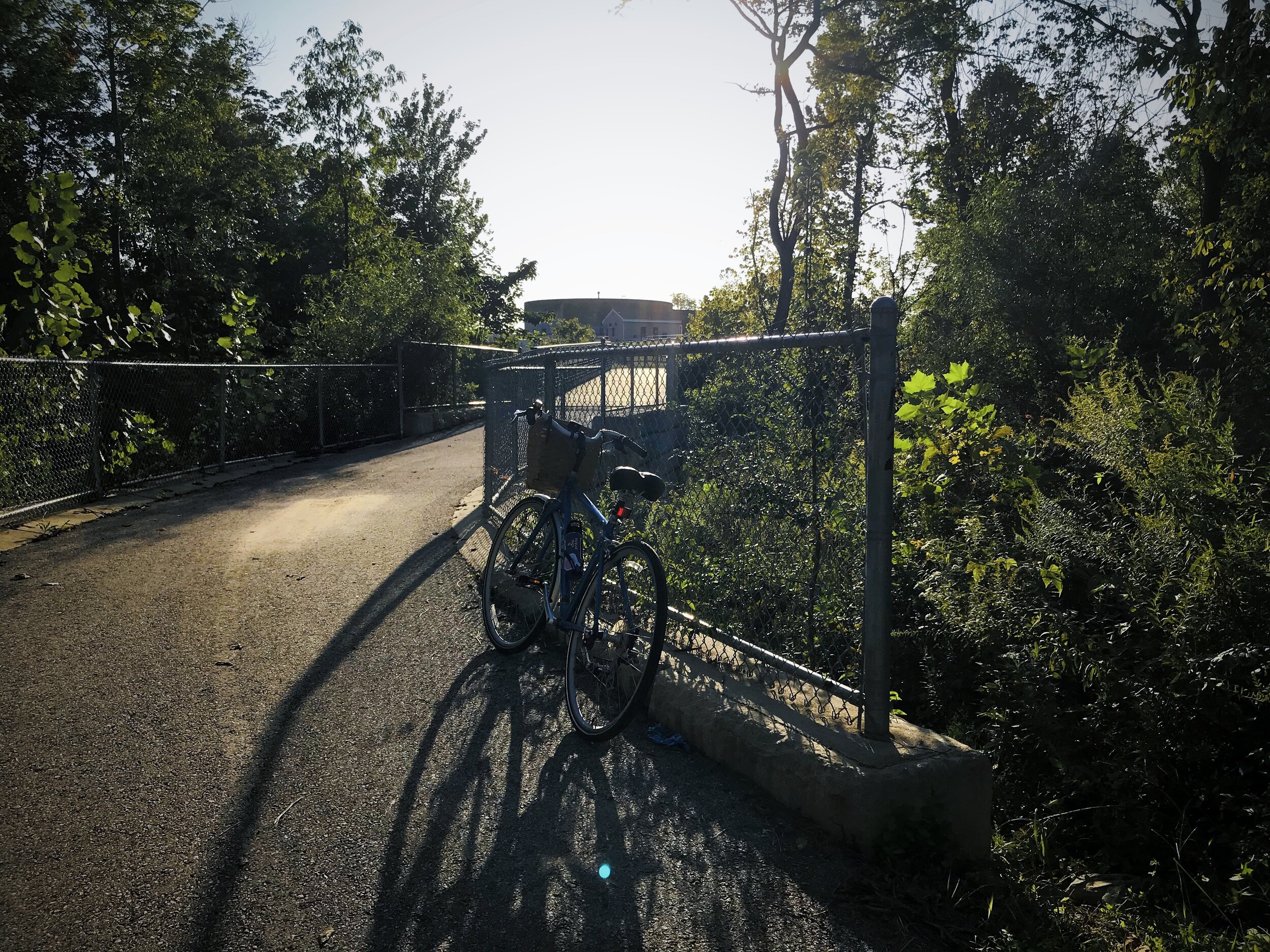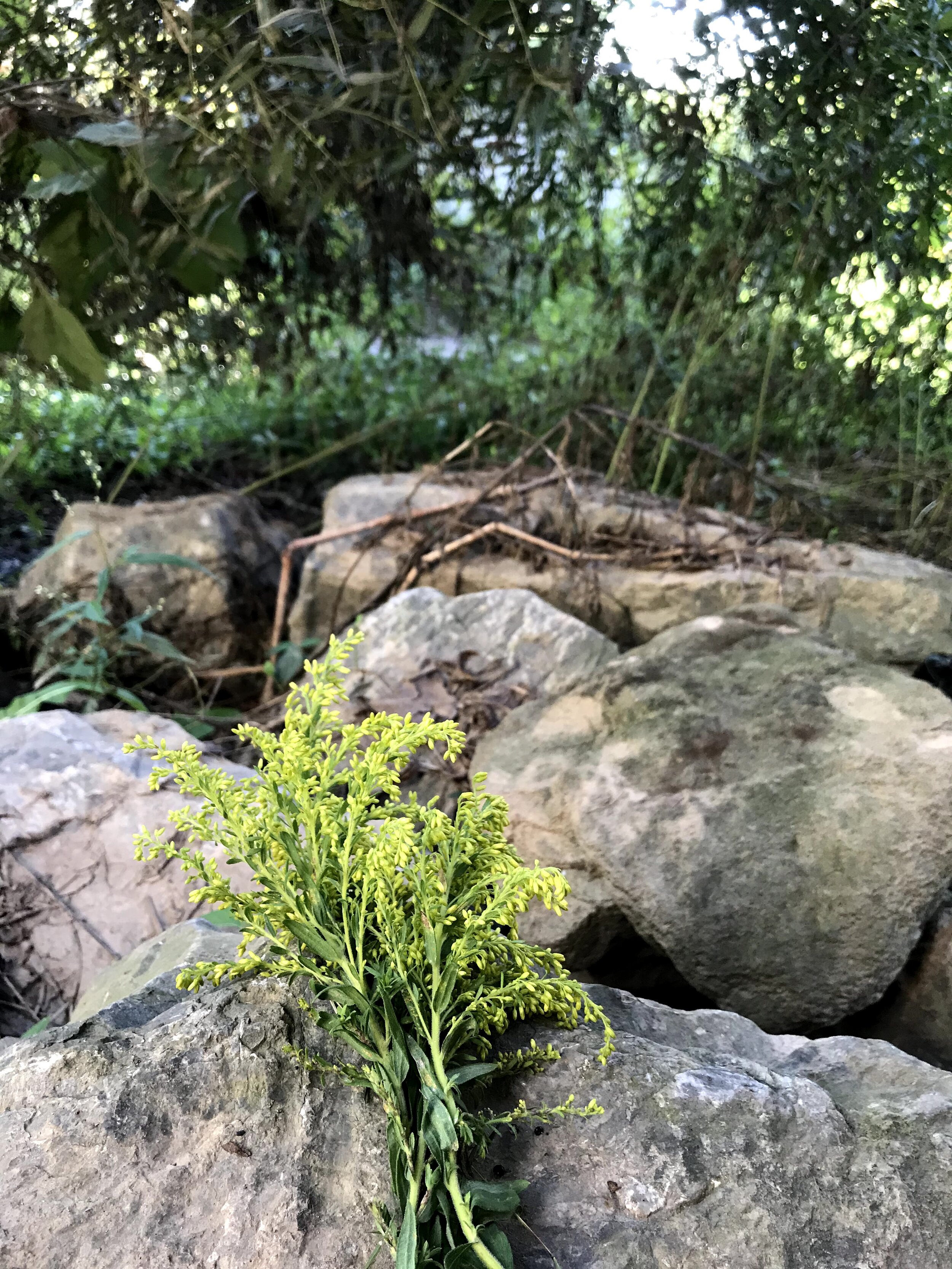One year ago today, I biked 24 miles, putting together the small number of incredibly vague clues I had, determined to find the exact spot where Carmen was last alive. And I found it. I had so little to go on. I listened to what I’d heard, went into his mind, and thought like him. I dipped into the deep waters of him and connected with what I knew. And I found it.
On the way, I collected a small bunch of wild goldenrod as I rode. Every time I’d see some, I’d pull over, pick one or two, and put it in my bike basket, then keep riding. When I had enough to suit my desires, I tied it all together with a piece of long, sturdy grass.
When I jumped on my bike that day, one year ago, I hadn’t ridden my bike more than a mile for a couple of years, I think. Toward the end of that 24-mile ride that day, I thought my legs would fall off. I could barely keep pedaling. But something inside of me kept pushing and burning and moving me – something spiritual and unexplainable. Something born of Love and mystery and passion and connection, and something stemming from a need as deep as wanting to know someone is out there looking for you.
When I did find the spot, there was a deep sense of both connection and loss. Knowing him, knowing Love, knowing grief, knowing I had found what I was looking for while also knowing I never wanted to be looking for such a thing. I sat there silently for a long time. I remember the sound of crickets, the wind blowing the trees, and gently flowing water. I remember the feeling of my hot tears making a silent path down my face. I was sitting with him again. Some part of him was still there, maybe waiting for me to come. I could feel him. And I knew that’s why I’d ridden there. I needed to feel his closeness. And nothing could have stopped me that day from finding that spot, finding that moment with him.
One year isn’t a very long time. Well, it is and it isn’t. As another grieving friend of mine said recently, time splits in two when these things happen. Everything is ripped in half, into “before” and “after.” All of my “before Carmen” days have a certain texture and hue to them. Knowing him made my life more rich and full of illumination. The “after Carmen” days have taken me to a certain kind of dark underworld where fire is changing me. It is painful. It is purifying (I trust). It is transformative.
The loss of Carmen’s physical form has made me primarily realize two things: 1) When you open your heart to someone and they go away, it is an absolutely terrifying thought to open your heart again, and it feels much safer to hide and keep it all closed up; and 2) It’s important and challenging to remember that opening your heart is how you found and connected with this person in the first place, so even in the midst of the unbearable burning sensation you feel inside that tells you to close up, opening yourself to Love and be Loved is why we are here.
I know death. I am intimately familiar with grief in a way I never had been. But Carmen is the first person who has truly taught me that death cannot stop Love. If Love isn’t unstoppable, unconditional, all-powerful, how could we possibly love someone even after they die?
Many days, I am a woman in a sorrowful state. But that’s not all I am. I have a lot of emotions and I choose to feel them. Sometimes they feel like trying to move through the thickest mud or trying to see clearly through a hazy liquid. But being able to feel my emotions, observe them with a sacred kind of honor, while not feeling obliged to let them take me for a ride … this feels like why I’m here.
It is the most powerful, yet-unknown-to-me, unpredictable emotions that teach me that I have a capacity for all things in the universe to exist inside of me. I value honesty and it is important to me that I relate honestly with my emotions. This honesty scares me, but it makes it more natural for me to be able to go into the darker places of myself and not feel like I have to stay there. As Rilke once wrote: No feeling is final.
So as I sit here in Carmen’s boxer shorts and write this, I remember (and hopefully remind you of) something very real: When we stay open; when we let Love be our primary animator, motivator, and meaning-giver; we flow. Openness allows the currents to come and go as they are meant to, and we can be alive. Even when it hurts, Love is the most expansive force out there. So let’s Love.
flower work
is
not easy.
remaining
soft in fire
takes
time.
(nayyirah waheed)

